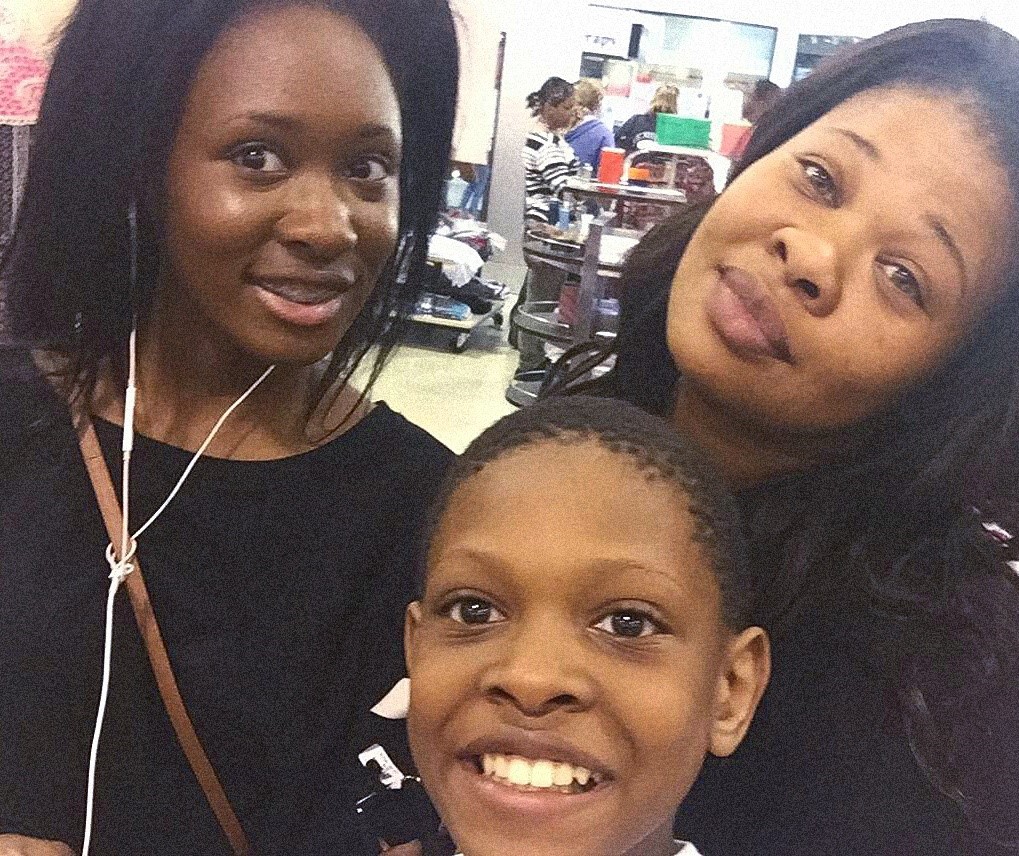She went to the hospital for a few days. The state kept her kids for 4 years
By Karen Weese
It didn’t seem like much—only $100. But Tiffany Simone didn’t have $100. And she couldn’t get her kids back any other way.
Simone had voluntarily placed her two children, 8-year-old Russell and 11-year-old Destinie, into the care of the state because she had no one who could watch them while she was hospitalized for a medical emergency. She assumed she would pick them up when she left the hospital, but the state said that, as a condition of their return, Simone first had to participate in supervised visits at a distant foster care office. (Simone is her middle name, which she requested be used in order to keep her children anonymous.)
Just a year prior, Simone could have made it to those visits easily—back when she still had a steady income from her job as a network administrator, a savings account, and a car. But she’d lost all of those things in her battle with ovarian cancer, and making the two-hour round-trip journey via public transportation would have cost $100 she didn’t have.
Instead, the state kept her kids.
She didn’t get them back for four years.
The only reason the children were ever returned at all, Simone says, was the assistance of One Can Help, an innovative nonprofit in Newton, Massachusetts, that pays for the relatively small but urgent financial needs of children and families involved in the foster care/juvenile court system. Each time the state set forth a new precondition for getting her kids back (such as visiting them in faraway foster home, getting a bigger apartment with a separate bedroom for each child, or securing a better-paying job), One Can Help came through with the small but crucial sum of money that helped her meet it: train tickets for the visit, part of the security deposit for the apartment, a bus pass for the new commute. “Every step of the way, every time there was a roadblock, they were there,” says Simone. “I know for a fact that without their help, I would never have gotten my kids back.”

Simone was never once accused of abusing her children—after all, she’d surrendered them voluntarily during a health emergency—but these seemingly small expenses could have permanently kept her family apart. She could have lost her kids forever, just for being poor.
And she isn’t alone. Across the country, thousands of families are prevented from being reunited simply because of barriers that a small amount of cash could solve. More than 60% of maltreatment cases are for neglect without abuse—which, in many cases, is just another way of saying “being poor.”
When parents are trying to meet the state’s preconditions to get their kids back from foster care, the state doesn’t differentiate between a parent who isn’t trying and a parent who just can’t afford what’s being required, says Anne Bader-Martin, a juvenile court attorney who founded One Can Help. By providing a cash infusion to help the family afford precisely the thing they need, at exactly the moment they need it, One Can Help can permanently alter the course of a family’s life—often for a relatively small dollar amount.
When a grandmother needed a twin bed by Tuesday morning so her grandson could enter kinship care at her home rather than being put in foster care with strangers, One Can Help bought the bed. (The state won’t place a child in any home without a designated bed for the child.) When two kids were about to be removed from a home because it didn’t have heat, One Can Help paid to fix the furnace. When a mom needed her car repaired so she could visit her kids in foster care and get to her job—a key step in demonstrating to the state that she was an engaged, stable parent—One Can Help paid for the repairs.
Rather than offering one-size-fits-all services—like providing backpacks to 100 foster kids, say, or treating 50 foster kids to a baseball game—every request is tailored to the individual child or family. Attorneys and social workers make requests for funds on behalf of their clients using an online application. Turnaround time from request to approval typically takes only 24 hours. Once the funds are approved, the attorney or social worker is responsible for carrying out the request (buying and arranging delivery of the bed, procuring the gas gift cards, etc.), and receives reimbursement after submitting a receipt. While some foster-care-focused organizations will only fund items or services for the child, says Bader-Martin, One Can Help will also fund things for the parents, since stabilizing the parent’s life stabilizes the child’s, too.
One Can Help paid the gas bill for a mom whose teenagers had been cited for truancy (the kids were too embarrassed to go to school because they couldn’t shower or wash their clothes; once the gas was back on, they returned to school). It has paid for classes, glasses, work uniforms, driver’s ed, the retrieval of an impounded car—whatever the child, parent, or family needed in that moment to keep the family together, reunite them faster, or provide a basic need.
“It makes a travesty of the system if you say to a person, ‘You better do this,’ but there are six barriers in the way and you do nothing to help them surmount them,” says Bader-Martin. “And this moment that they are involved with the court or social services, this moment of crisis, where the stakes are high—this is the moment that we should be helping them.”
Last year, One Can Help served 2,541 Massachusetts children. By keeping kids out of foster care or getting them home sooner, reducing court costs, and shrinking the need for other social services, One Can Help saved the state of Massachusetts more than $9 million in one year, according to an independent study conducted by Boston University.
The U.S. spends $30 billion a year on its foster care system, yet child welfare agencies are consistently short-staffed and underfunded, and few social workers are given the resources to offer financial assistance of any kind.
“There’s just nothing offered by the state for this sort of thing. Sometimes you can ask, but rarely have I ever gotten any kind of financial help for a client,” says Elaine DeMeo, an attorney in Attleboro, Massachusetts, who received assistance from One Can Help to buy a bunk bed for two elementary-aged girls. “I don’t think most people really understand the role that poverty plays, how it impacts these families,” she says. “There’s a lack of money to do even the simplest things, the things we take for granted.”
Research suggests that simply being in foster care with strangers—even kind and well-intentioned strangers—is in itself a form of trauma, an adverse childhood experience with long-lasting negative consequences for attachment and other outcomes. Kids generally do better when they can stay with their families, says Johanna Greeson, an associate professor of social work at the University of Pennsylvania. “In many instances, we’re quick to remove children, instead of thinking, ‘What can we do to keep this family together?’” she says. “Of course if there are blatant safety concerns, you have to remove children, but sometimes kids are being removed for ‘neglect’ simply because the house has no functioning refrigerator. Wouldn’t it be better to just get them a fridge?”
It’s a question that more people should be asking, advocates and researchers say. “Even modest economic supports can stabilize families and alleviate the need for more intensive intervention” such as foster care, write Dana Weiner, Clare Anderson, and Krista Thomas, senior policy fellows at Chapin Hall, an independent policy research center at the University of Chicago.
While there are many organizations that serve foster kids or help struggling parents in some way, One Can Help is unique in its speed, the way it tailors its response to the specific recipient, and its willingness to focus on the family as a unit, not just the child, says Greeson.
“This organization is doing what our child welfare system should be doing—responding to what the specific need is, and being nimble enough to do it quickly,” she says. “Until the child welfare system in this country has a big shift in how we think about caring for families, we’re going to need organizations like this.”
The idea for One Can Help was born in a fast-food restaurant. Bader-Martin was sitting with a newly pregnant 15-year-old client, and as they talked, the girl kept pulling out a photo of a stroller she wanted to get for her baby. Bader-Martin tried to steer the conversation to more practical matters, like where the girl would live and how she would support herself, but the girl couldn’t stop talking about how much she wanted that stroller for her baby. As the man behind them rose to leave, he handed Bader-Martin a check for $175. “Get her the stroller,” he said. (“We all started to cry,” says Bader-Martin.)
“At that moment I knew that if only [people] knew what our clients were facing, they would want to help,” she says. She just had to find a way. Privacy concerns made it difficult, because all court proceedings are confidential, and as a full-time attorney, she didn’t have time to drive around delivering items or orchestrating the details of arranging and paying for services. It also felt unsettling to just start handing out cash to individual clients, so she landed on the idea of having attorneys and social workers apply on behalf of their clients.
Bader-Martin ran the organization in her spare time from its founding in 2005 until 2019, when she dialed back her own work as an attorney to become OCH’s part-time executive director and hired four part-time employees. Funds come primarily from individual donations and private foundations; after Bader-Martin approached her state legislator a few years ago, the state of Massachusetts has also contributed, typically $50,000 a year. Initially just serving one county, the organization now serves the whole state, disbursing $280,000 last year and a total of more than $1 million over the past decade. Bader-Martin says her dream is to see the concept replicated around the country.
Tiffany Simone, for her part, has spent the last five years working hard to piece her family’s life back together. Her son, now a teenager, is still young enough to live at home with her; she has an apartment, a car, and a good job working as an installation coordinator for a Fortune 500 company. She quietly makes a small donation to One Can Help when she can—and prays that what happened to her family never happens to anyone else.
(9)



